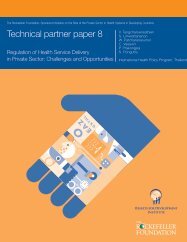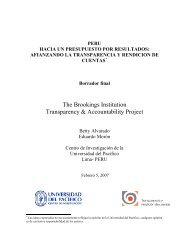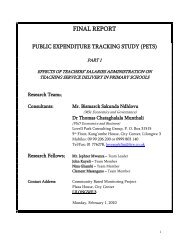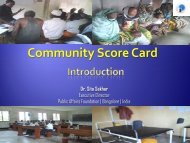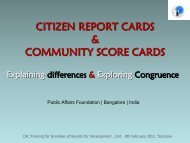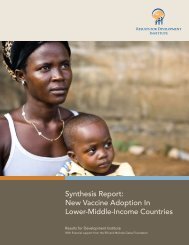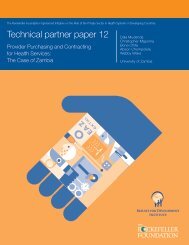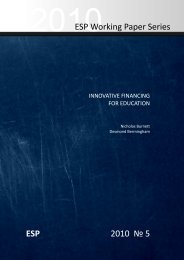Innovative Secondary Education For Skills Enhancement
Innovative Secondary Education For Skills Enhancement
Innovative Secondary Education For Skills Enhancement
You also want an ePaper? Increase the reach of your titles
YUMPU automatically turns print PDFs into web optimized ePapers that Google loves.
Introduction<br />
Over the course of 2012, Results for Development Institute (R4D) worked with regional<br />
partners in Africa and Asia to examine employer needs, explore existing curricula<br />
systems, and identify existing innovative skills delivery models under the <strong>Innovative</strong><br />
<strong>Secondary</strong> <strong>Education</strong> for <strong>Skills</strong> <strong>Enhancement</strong> (ISESE) project. The resulting twelve<br />
background studies include a broad reviews of issues related to skills, education, and<br />
economic development in our 12 focus countries across Africa and Asia 1 . The two<br />
reports presented here are a synthesis of key findings from this background research.<br />
By 2030, the global labor force will reach 3.5 billion, and unless secondary education<br />
enrollment doubles or triples, one billion of these workers will lack secondary<br />
education, with 60 percent of these in South Asia and Africa. 2 While many countries<br />
in these regions have raised secondary education as a priority, the explicit link between<br />
secondary education and skills for employment is still absent in many national<br />
education systems—a significant problem given the fact that most youth entering the<br />
workforce will not obtain any education beyond the secondary level. In addition, an<br />
increasingly interconnected global economy and rapid evolution of traditional labor<br />
roles means that conventional ways of delivering skills for employment—for example,<br />
traditional vocational training models—are becoming less relevant and responsive to<br />
workforce demands. There is therefore an urgent need to reevaluate the skills needed<br />
for employability in the 21st century economy, and to find innovative models to deliver<br />
these skills to students.<br />
Our research reveals that while technical and basic cognitive skills are still important in<br />
the workplace, transferrable and non-cognitive skills such as communication, problemsolving,<br />
punctuality, and flexibility are increasingly important, particularly for the<br />
informal economy. Improving pedagogy is also central to increasing youth employability<br />
in developing countries. Key features of models that successfully deliver these critical<br />
skills include an emphasis on multi-stakeholder partnerships, updated pedagogy, and<br />
innovative financing mechanisms to improve access, quality and relevance of skills at the<br />
secondary level.<br />
Effective skills development policies and approaches can be instrumental in equipping<br />
youth with the skills and competencies needed to find and maintain employment<br />
in today’s dynamic labor environment. However, questions remain about how to<br />
methodically classify these new and important sets of skills, identify successful ways<br />
of imparting them, and most importantly, what resources are needed to scale-up these<br />
models to create the most impact on youth employability in the developing world today.<br />
Nick Burnett<br />
Managing Director<br />
R4D<br />
1 The ISESE background studies can be found on R4D’s website: http://resultsfordevelopment.org/knowledge-center/innovative-secondary-education-skillsenhancement-isese-phase-i-research<br />
2 The world at work: Jobs, pay, and skills for 3.5 billion people. McKinsey Global Institute, June 2012.<br />
<strong>Skills</strong> for Employability in Africa and Asia 1





